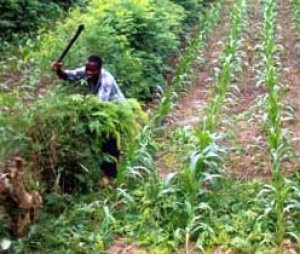- Home - News
- TWI News | TV
- Polls
- Year In Review
- News Archive
- Crime & Punishment
- Politics
- Regional
- Editorial
- Health
- Ghanaians Abroad
- Tabloid
- Africa
- Religion
- Election 2020
- Coronavirus
- News Videos | TV
- Photo Archives
- News Headlines
- Press Release
Business News of Tuesday, 30 August 2016
Source: rainbowradioonline.com
Government performance in agric sector not encouraging - Lecturer
A senior lecturer at the Kwame Nkrumah University of Science and Technology (KNUST), Dr. Robert Aidoo has advised government to prioritize agriculture if the state wants the rate of unemployment to reduce drastically.
The expert argue that if the same focus and attention given to issues relating to oil is applied to agriculture, the state would be able to address the challenges and problems we're currently encountering in the sector.
''The rate of unemployment in the country is due to the fact that government is not investing in agriculture. I can say it without fear of contradiction that, if we do not invest in agriculture, there is no way we can eradicate unemployment in Ghana...If we want to generate employment, it is agriculture that would bring the jobs. So all those who are talking about jobs, have to support agriculture and industry; when these two are working well, that is when the country will develop. If you have a country with the services sector contributing over 60 percent to the GDP, that is the country that is not doing well.''
Dr. Robert Aidoo speaking in an interview with Kwame Tutu on Rainbow Radio 87.5Fm said, government should be considering the setting up of a technical committee with better understanding of issues relating to agriculture to help government address the issues holistically.
He explained that people who are currently advising government lack deeper understanding on matters relating to agriculture hence their inability to outline policies to better the sector.
The agric sector he posited employs more than any other sector in the country, therefore the need to invest in the sector.
Agricultural inputs, logistics and issues bothering on mechanization are among the few things he felt could help farmers to improve upon their yields and be abreast with latest trends in the sector.
''Government should make its priorities right. It is only agriculture that Ghana has a comparative advantage over. So it is imperative for us to focus on it the more. Extension officers should be well resourced so they are able to work effectively. The research officers should also be well resourced.''
He said resources allocated to research officers is not enough and sometimes do not even come on time. Dr. Aidoo added that, the research officers do not want to go on record over the challenges they are currently going through, however, the reality on the ground is such that, they are having difficulty with resources to work efficiently.
He based his argument on the premise that, people who work in the services sector are few and that majority of owners of such facilities are non-Ghanaians, ''so when they get all these profits, they send them back to where they come from. So I'm just saying that it is important we re-prioritize and go back to where we stopped before the state can transform and develop. Any government that prioritize agriculture would turn this country around quickly.''
Dr. Aidoo also debunked suggestions that budget allocation to the sector is huge stating further that, Ghana should go back to the Maputo declaration where African governments were admonished to commit 10 percent of their national budget to agriculture if they want the sector to improve, ''but when we take a look at the whole of Africa, the budget allocation given to agriculture is below 5 percent.''
He said a greater chunk of our national budget is used for emoluments and people may think that on the face of it, the allocation to agriculture is huge but percentage wise, agric has not had its fair share. So if you have a sector that is employing more than 55 percent of your active labour force, then you should take that sector very seriously. There is no sector in Ghana that employs as many people as agriculture does. So if we have something to do, then we should allocate 20 percent of our budget into agriculture...If government is able to even allocate 10 percent of its annual budget, you will see a consistent growth in agriculture and that would help the country move forward, he said.











